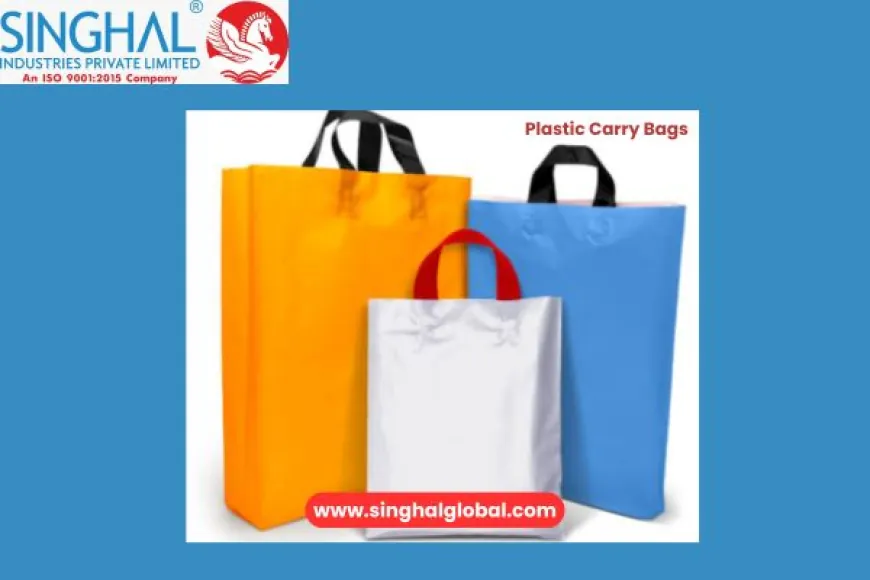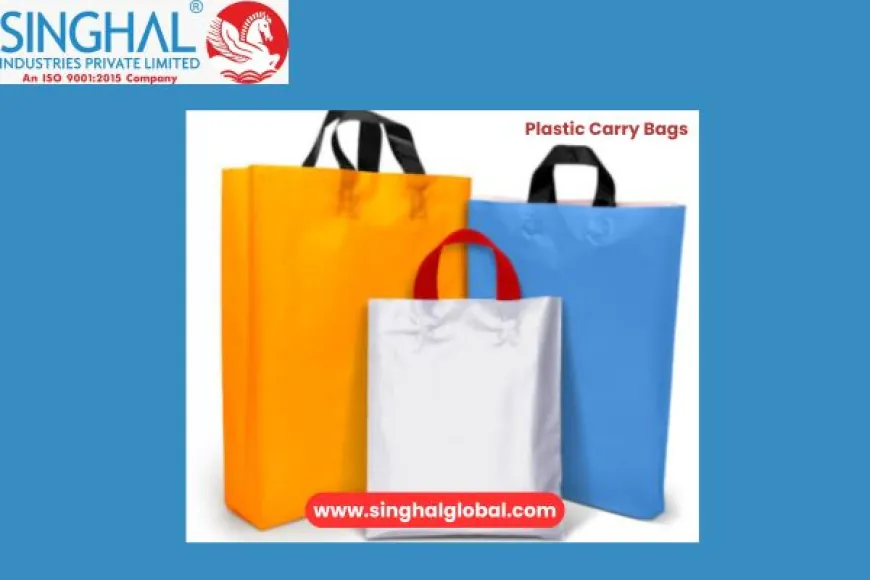Polythene Carry Bags: The Ubiquitous Choice for Modern Shopping
Learn about Polythene Carry Bags and Shopping Plastic Bags, their benefits, environmental impact, and the innovations by Carrier Bag Manufacturers to offer eco-friendly alternatives for a sustainable future.

In today's fast-paced world, convenience is key, and one product that has seamlessly integrated into our daily lives is the Polythene Carry Bag. These lightweight, durable, and cost-effective bags are widely used for shopping purposes, making them a staple in stores, supermarkets, and markets across the globe. Whether you're grabbing groceries, fashion items, or household essentials, it’s likely that a Shopping Plastic Bags will come in handy at some point. This article explores the role of Polythene Carry Bags, the growing industry of Carrier Bag Manufacturers, and the pros and cons of their use.
The Rise of Polythene Carry Bags
Since their introduction in the mid-20th century, Polythene Carry Bags have transformed the way people shop. Initially celebrated for their lightweight structure and ease of production, they became a widespread replacement for cloth and paper bags. These bags are created from polyethylene, a type of plastic made from natural gas and petroleum, which is both affordable and versatile. Over the years, Carrier Bag Manufacturers have honed their techniques to produce billions of these bags annually for retail, groceries, and general consumer use.
One of the primary reasons for the mass adoption of Shopping Plastic Bags is their cost-effectiveness. Businesses often opt for them because they are cheaper to produce in large quantities compared to alternative materials like paper or fabric. Additionally, they can be printed with company logos and marketing messages, making them an excellent tool for brand promotion.
Shopping Plastic Bags and Their Global Usage
When you think of the modern shopping experience,

Shopping Plastic Bags are practically synonymous with it. They are available in various sizes, colors, and thicknesses, serving as convenient carriers for almost any item. Whether it's a small boutique or a large supermarket, Polythene Carry Bags are a go-to solution for customers to take home their purchases securely and easily.
Furthermore, the retail sector heavily relies on these bags for their flexibility. Carrier Bag Manufacturers have innovated by creating different types of Polythene Carry Bags to meet the unique needs of retailers. Some are equipped with features like reinforced handles, reusability, and even biodegradable options, aligning with the growing demand for sustainable products.
Environmental Concerns and the Shift to Sustainable Alternatives
While Polythene Carry Bags have undeniably been beneficial for businesses and consumers alike, their widespread use has raised concerns over environmental impact. The non-biodegradable nature of traditional Shopping Plastic Bags means that they can linger in the environment for hundreds of years, contributing to pollution and posing a threat to wildlife.
Governments and environmental organizations worldwide have taken notice. Many countries have implemented bans, taxes, or restrictions on single-use Polythene Carry Bags in an effort to curb plastic waste. These regulations have sparked a surge in the demand for eco-friendly alternatives, prompting Carrier Bag Manufacturers to explore biodegradable and compostable options.
Biodegradable plastic bags, made from plant-based materials, break down more easily in the environment. Some Carrier Bag Manufacturers have also developed reusable shopping bags made from recycled plastic or other sustainable materials. These alternatives help reduce the environmental footprint while still providing the convenience that consumers have come to expect from Shopping Plastic Bags.
The Role of Carrier Bag Manufacturers
The future of Carrier Bag Manufacturers lies in innovation and adaptability. With the global shift towards sustainability, manufacturers are finding new ways to produce eco-friendly Polythene Carry Bags that cater to the needs of businesses and consumers alike. Many companies are now focusing on creating biodegradable, compostable, and recyclable bags that offer the same functionality as traditional plastic bags but with a reduced environmental impact.
Furthermore, manufacturers are developing stronger, reusable bags that are designed for multiple uses. These options not only cut down on waste but also encourage consumers to make more environmentally-conscious choices. As consumers become more aware of the environmental impact of single-use plastics, the demand for sustainable shopping solutions continues to grow.
Conclusion
Polythene Carry Bags have played a pivotal role in shaping the modern shopping experience. Their affordability, convenience, and adaptability have made them a popular choice for retailers and consumers worldwide. However, with growing concerns over plastic pollution, the industry is evolving. Carrier Bag Manufacturers are stepping up to the challenge by developing innovative, eco-friendly alternatives that cater to the changing demands of the market. As we move towards a more sustainable future, the role of Shopping Plastic Bags and their manufacturers will continue to adapt, balancing convenience with environmental responsibility.
FAQs About Polythene Carry Bags
-
What are Polythene Carry Bags?
Polythene Carry Bags are lightweight, durable bags made from polyethylene plastic. They are widely used in retail and grocery stores for carrying purchases. -
Why are Shopping Plastic Bags so popular?
Shopping Plastic Bags are popular because they are cost-effective, easy to produce, and highly convenient for both retailers and customers. -
Are Polythene Carry Bags eco-friendly?
Traditional Polythene Carry Bags are not eco-friendly as they are non-biodegradable and contribute to plastic pollution. However, there are biodegradable and recyclable alternatives available. -
What is the role of Carrier Bag Manufacturers?
Carrier Bag Manufacturers produce and supply various types of shopping bags, including traditional plastic bags and eco-friendly alternatives. They cater to retailers and businesses across different industries.
What's Your Reaction?
 Like
0
Like
0
 Dislike
0
Dislike
0
 Love
0
Love
0
 Funny
0
Funny
0
 Angry
0
Angry
0
 Sad
0
Sad
0
 Wow
0
Wow
0






















































